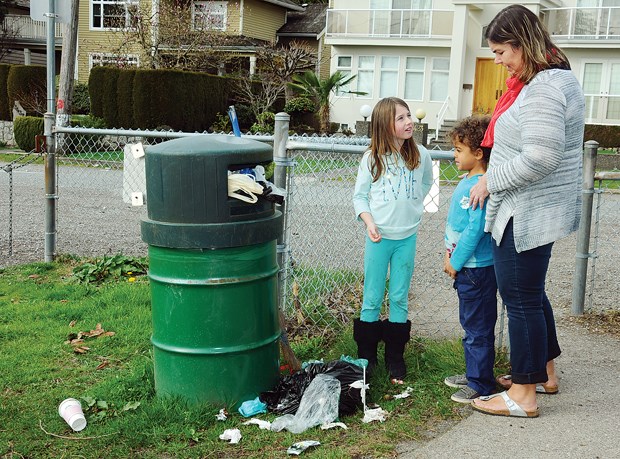The actions of some irresponsible residents have raised the ire of one West Vancouver child-care operator, who says it’s time to start setting a better example for the little ones.
Margot Leeson, manager of care at Irwin Park Treehouse, a non-profit children’s facility in the District of West Vancouver is fed up with the garbage she often sees overflowing from a trash bin near the facility.
She says a lot of the garbage is dog waste, which comes from owners using the daycare’s play yard as their own personal dog park, despite signs prohibiting it. Leeson said the district’s reduced trash pickup bylaws were created to help people reduce their waste, not simply dump it to the point of overflowing in other facilities. She said that recyclable items make up a portion of the waste she sees.
“I really feel a bit frustrated that these people are apparently choosing not to spend five minutes to recycle these products which would reduce the overall amount of waste that they are producing,” said Leeson. “And choose rather put it into an overflowing garbage can in a children’s play area.”
Leeson explained that children tend to learn by example and that adults dumping their garbage in this way is a bad one to be showing them.
“What children are actually seeing on a daily basis when they come into their play area is this overflowing garbage can, adults completely disregarding what we know is a sensible, systematic approach.”
Jeff McDonald, communications director for the District of West Vancouver said residents dumping waste in public trash receptacles has been an ongoing problem for the district since switching to bi-weekly collection at the beginning of 2014.
“This particular area, as with many areas within the district is indeed an area where people are disposing of household garbage. This is happening all across the district . . . It’s an ongoing problem that we have to deal with,” he said.
McDonald said public trash bins are emptied biweekly, however due to complaints the district has received on this particular bin, collection has been stepped up to every week. District staff work with the bylaw department, explained McDonald, who said publicly discarded trash is looked through for identifiers such as a name or address.
If identified, individuals are first sent a letter telling them not to dump their garbage anymore, according to McDonald, while second offenders are generally fined.
However at this particular location no identifiers have yet been found.
Despite the reduction to bi-weekly pickup in the City of North Vancouver and the District of West Vancouver (the District of North Vancouver still has weekly pickup,) food waste bins are now in use across all three municipalities and picked up weekly.
Pet waste is prohibited in the garbage and must be disposed of through dog waste receptacles that can be found in most parks that allow dogs.
For residents with a higher than expected load of household garbage, tags that allow for extra pickup can be purchased.
In the District of West Vancouver, tags can be bought for $6 each at both the West Vancouver and Gleneagles community centres or at the municipal hall. In the
City of North Vancouver extra garbage tags can be purchased at city hall or Harry Jerome Recreation Centre for $3 each and in the District of North Vancouver extra garbage tags are available at all recreation community centres and sell for $3 each. Each tag allows for a user to add one additional 77-litre can or bag on top of the two allowed with each pickup.



